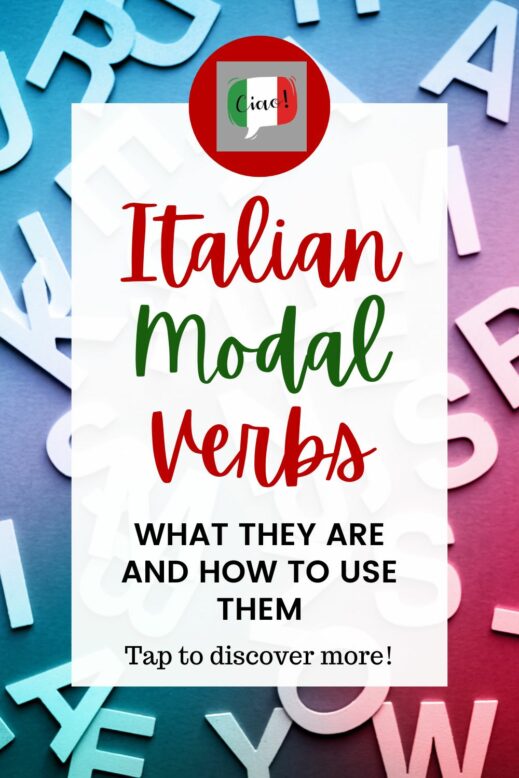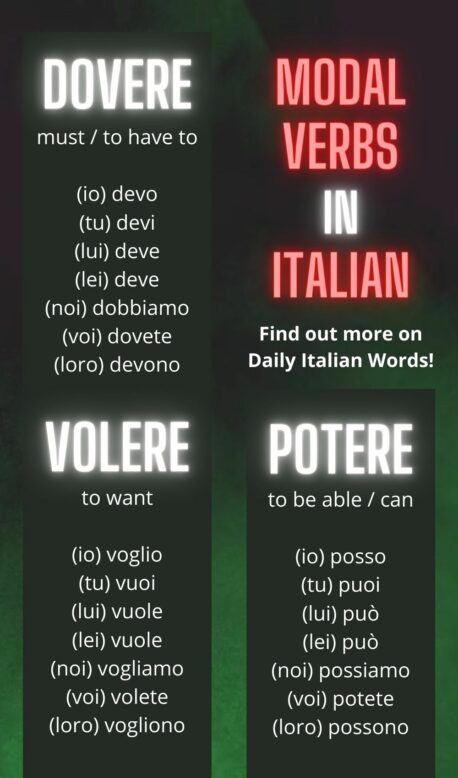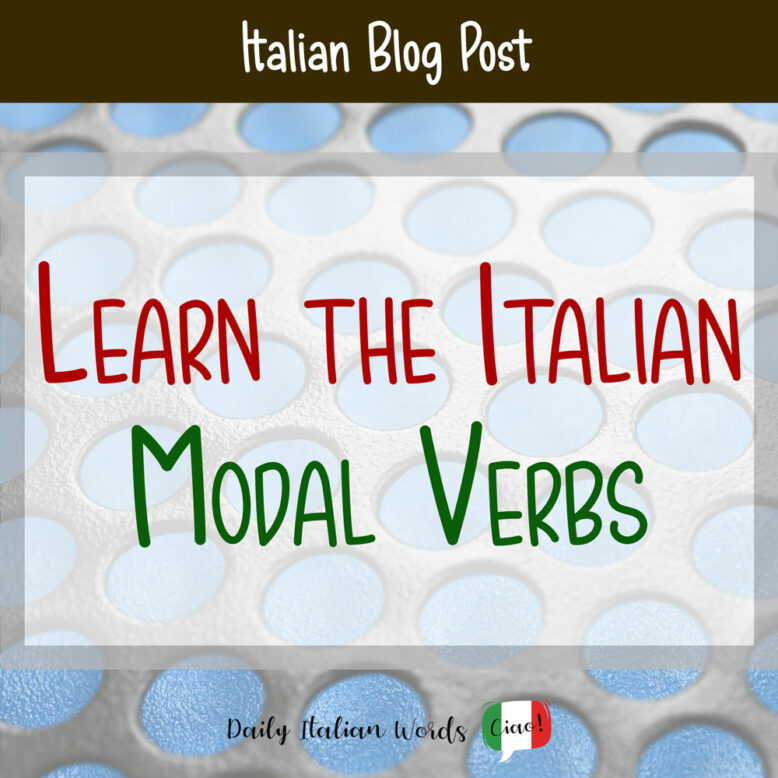“Modal verb.” Sounds like a scary grammatical term, doesn’t it? Well, it actually isn’t as fear-inducing as you might think!
Modal verbs – known as a verbi servili in Italian – always serve the verb that follows them. Their job is to express likelihood, ability, permission, request, capacity, suggestion, order, obligation, or advice, or in other words, matters beyond the factual here and now.
In English, some of the most common modal verbs include can, could, may, might, shall, should, will, would, and must whereas in Italian, there are just four to worry about:
Volere
to want
Potere
to can / to be able to
Dovere
to have to / to must
Sapere
to know how to / to be able to
Let’s take a moment to investigate each verb and understand how it is used in context.

Volere
Volere means “to want” or “to wish” in Italian and it is used to communicate desires and wishes. It conjugates in the following manner in the present tense:
- (io) voglio = I want
- (tu) vuoi = you want (singular, informal)
- (lui) vuole = he wants
- (lei) vuole = she wants
- (Lei) vuole = you want (singular, formal)
- (noi) vogliamo = we want
- (voi) volete = you want (plural)
- (loro) vogliono = they want
Any verb that follows the conjugated form of volere must be in its infinitive form. In the following sentence, for example, the verb restare (to stay) doesn’t change after voglio (I want).
Voglio restare qui.
I want to stay here.
In its conditional form, the meaning of volere shifts from “want” to “would like“.
- (io) vorrei = I would like
- (tu) vorresti = you would like (singular, informal)
- (lui) vorrebbe = he would like
- (lei) vorrebbe = she would like
- (Lei) vorrebbe = you would like (singular, formal)
- (noi) vorremmo = we would like
- (voi) vorreste = you would like (plural)
- (loro) vorrebbero = they would like
Here again, you can place any infinitive verb after the conditional form of volere.
Vorrei andare a casa.
I would like to go home.

Potere
Potere means “can” “to be able” or “to be allowed to” in Italian and it is used to describe possibilities, permission and abilities. It conjugates in the following manner:
- (io) posso = I can / I am able to / I am allowed to
- (tu) puoi = you can / you are able to / you are allowed to (singular, informal)
- (lui) può = he can / he is able to / he is allowed to
- (lei) può = she can / she is able to / she is allowed to
- (Lei) può = you can / you are able to / you are allowed to (singular, formal)
- (noi) possiamo = we can / we are able to / we are allowed to
- (voi) potete = you can / you are able to / you are allowed to (plural)
- (loro) possono = they can / they are able to / they are allowed to
As with volere, you can place another verb in its infinitive form after the conjugated form of potere to form a sentence. For example:
Posso andare io a fare la spesa.
I can / am able to go shopping.
Puoi andare se vuoi.
You can / are allowed to go if you want.
In its conditional form, the meaning of potere shifts from “can” to “could” “might” or “may“. It is often used when making polite requests.
- (io) potrei = I could / I might / I may
- (tu) potresti = you could / you may / you might (singular, informal)
- (lui) potrebbe = he could / he may / he might
- (lei) potrebbe = she could / she may / she might
- (Lei) potrebbe = you could / you may / you might (singular, formal)
- (noi) potremmo = we could / we may / we might
- (voi) potreste = you could / you may / you might (plural)
- (loro) potrebbero = they could / they may / they might
Here again, you can place any infinitive verb after the conditional form of potere.
Potrei venire con voi se vi fa piacere.
I could come with you if you’d like.
Oggi potrebbe piovere.
It might / may rain today.
A common mistake learners make is to use potere to ask someone if they know how to do something. For example:
❌ Puoi cantare? = Can you sing? (Do you know how to sing?)
✔️ Puoi cantare? = Can you sing? (I am asking you to sing for me. – OR – I am asking if you are allowed to sing.)
To ask if someone knows how to do something, it is best to use the modal verb sapere which we’ll explore further down.

Dovere
Dovere is a modal verb used to express obligations, needs and occasionally suppositions about something that is likely in Italian. It usually translates as “to have to” “must” or “to need to“. Here is how it conjugates in the present tense:
- (io) devo = I have to / I must / I need to
- (tu) devi = you have to / you must / I need to (singular, informal)
- (lui) deve = he has to / he must / he needs to
- (lei) deve = she has to / she must / she needs to
- (Lei) deve = you have to / you must / you need to (singular, formal)
- (noi) dobbiamo = we have to / we must / we need to
- (voi) dovete = you have to / you must / you need to (plural)
- (loro) devono = they have to / they must / they need to
Here are a couple of example sentences that demonstrate how to use dovere in a sentence.
Dobbiamo andare!
We have to go! / We must go! / We need to go!
Tu devi essere Maria. Piacere di conoscerti!
You must be Maria. Pleasure to meet you!
In its conditional form, dovere usually translates as “should“.
(io) dovrei = I should
(tu) dovresti = you should (singular, informal)
(lui) dovrebbe = he should
(lei) dovrebbe = she should
(Lei) dovrebbe = you should (singular, formal)
(noi) dovremmo = we should
(voi) dovreste = you should (plural)
(loro) dovrebbero = they should
Dovresti andare via.
You should leave.


Sapere
Sapere (whose primary translation is “to know“) isn’t always officially classified as a modal verb in grammar books because it only has a modal function when the meaning is “to be able to” or “to know how to do“. Here is how you would conjugate it in the present tense:
(io) so = I am able to / I know how to
(tu) sai = you are able to / you know how to (singular, informal)
(lui) sa = he is able to / he knows how to
(lei) sa = she is able to / she knows how to
(Lei) sa = you are able to / you know how to (singular, formal)
(noi) sappiamo = we are able to / we know how to
(voi) sapete = you are able to / you know how to (plural)
(loro) sanno = they are able to / they know how to
And here are an example sentence showing it in use:
Luisa sa cantare ma non sa ballare.
Luisa knows how to sing but she doesn’t know how to dance.
Luisa is able to sing but she isn’t able to dance.
In its conditional form, sapere usually translates as “would be able to” “could” or “would know how to“.
(io) saprei = I would be able to / I could / I would know how to
(tu) sapresti = you would be able to / you could / you would know how to (singular, informal)
(lui) saprebbe = he would be able to / he could / he would know how to
(lei) saprebbe = she would be able to / she could / she would know how to
(Lei) saprebbe = you would be able to / you could / you would know how to (singular, formal)
(noi) sapremmo = we would be able to / we could / we would know how to
(voi) sapreste = you would be able to / you could / you would know how to (plural)
(loro) saprebbero = they would be able to / they could / they would know how to
Sapresti fare questo lavoro?
Would you know how to do this job?


Heather Broster is a graduate with honours in linguistics from the University of Western Ontario. She is an aspiring polyglot, proficient in English and Italian, as well as Japanese, Welsh, and French to varying degrees of fluency. Originally from Toronto, Heather has resided in various countries, notably Italy for a period of six years. Her primary focus lies in the fields of language acquisition, education, and bilingual instruction.


